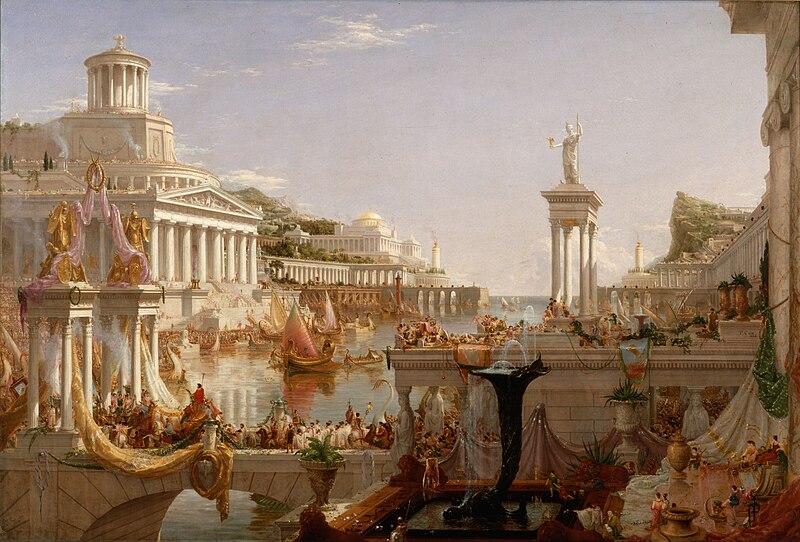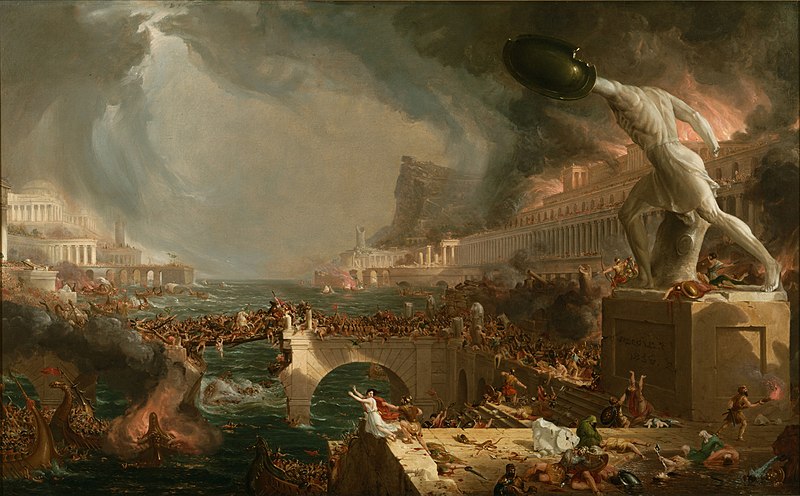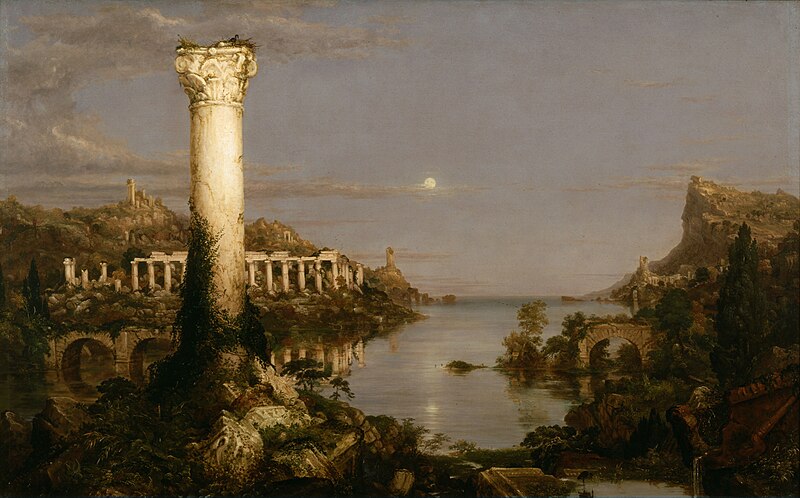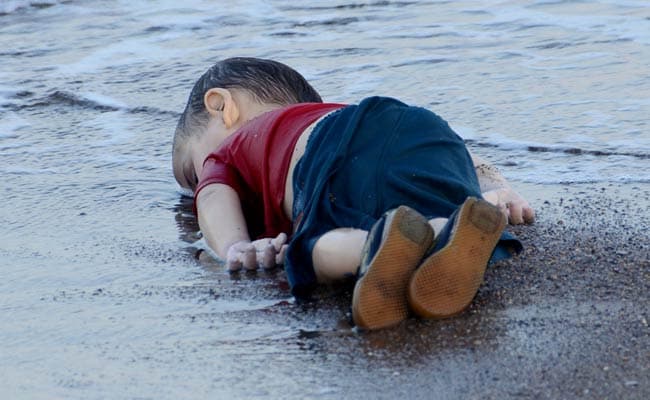One of the things that’s most interesting is the way Wyman fills in the gaps of how these kinds of power transitions occurred in practice. A particularly fascinating story is about the end of Roman Britain. As Wyman puts it:
The Irish came from across the sea to the west. The Picts came south, through and around Hadrian’s formerly great wall. And the Saxons came from the North Sea coast of the continent. They plundered and burned, pillaged and raped, killed and took captives. Without the Roman army to defend them, the Britons were helpless to beat back the attacks of these marauders. Within a generation, most of what remained of Roman Britain was lost and gone forever.
In the first episode of this show, I emphasized the importance of taking a regional approach. The fall of the roman empire happened in much different ways in different places. Some regions barely experienced anything we would call a disruption until the year 500 or even later, whereas others were barely recognizable in comparison to their former selves by that date. No province of the former Western Roman Empire went down faster or harder than Britain. And no region was more fundamentally or more deeply transformed by processes that we are calling the fall of the Roman Empire.
The island fragmented politically into a patchwork of new kingdoms ruled by petty tyrants, some of them native, some of them foreign born. The level of material sophistication dropped off drastically. By 500, nobody knew how to run a proper bathhouse, or, more seriously, even how to build in stone. The economy grew simpler, and barter replaced cash money. Urban centres shrank and all but disappeared. Roman Law Codes and legal concepts fell out of use. People stopped speaking Latin as an everyday language. Most strikingly, mass immigration from the continent completely rewrote the political, linguistic, and demographic map of the island. Britain represents the catastrophe side of the fall of the Roman Empire. In almost no facet of life was there recognizable continuity between Roman Britain in the 4th century and Anglo-Saxon England in the 7th.
So what was happening in the garrisons in the meantime? Well, what was left of the troops still in the the garrisons mostly supported themselves and stayed supplied by assessing taxes on the local population. By this point, these were mostly taxes in kind, as coin was becoming increasingly rare, another aspect of Empire receding. While it’s not like the locals exactly had a choice about paying these taxes to support the garrisons, it’s not obvious that they were unhappy with the arrangement either, as the garrison kept them defended from raiding parties like the Picts, the Scots or the Saxons. These groups had been increasing their raids even during the period of effective Roman rule in the 4th century, and this just got worse once Roman rule declined. In some places, such as along Hadrian's Wall, the garrisons continued to operate. As long as the general was competent enough to keep the people happy and the troops loyal (since by this point, the troops had much more loyalty to their local leader than the far-distant Emperor they hadn’t heard from in years), things scraped by.
Though as you can imagine, losing the support of Rome did have disastrous effects on the ability of the garrisons to actually defend the people. In the 5th century, along Hadrian's wall or in the east of Britain, you were between three to five times more likely to have a blade wound visible in your skeletal remains as people during the height of Roman Britain. As some Britons wrote in 446 in a letter to the Roman general Aetius
To Aeutius, thrice consul, come the groans of the Britons. The barbarians drive us into the sea, the sea drives us back on the barbarians. Between them, two kinds of death face us. We are either slaughtered, or drowned.But no help was forthcoming. Aetius had his own problems.
And so as Rome collapsed, the autonomy of these local generals gradually increased, until there wasn’t anyone giving them orders any more. But this didn’t come at a definite point where they were explicitly cut loose, and the nature of what they were doing didn’t experience any sharp shifts – it’s just that over time it become gradually apparent that nobody was coming anymore, and they were on their own. As a result, the distinction between “Roman general in an outlying garrison” and “local warlord” was a very blurred one in this period. There was a guy, he gave orders, they got obeyed. He may have nominally claimed to do so on behalf of Rome, but the frequency of invoking Rome as the basis of authority probably also declined until eventually it stopped altogether. At some point, the general started calling himself “King”. In an alternative timeline, maybe some future Roman Emperor might have turned up to re-establish authority. But it never happened.
In other places, the garrisons were sufficiently worthless that the job of defending the populace fell to local elites instead. Perhaps you armed some of your peasants to defend against the Saxon raiders, and gradually figured out enough how to fight them off. Again, like before, if you end up commanding enough people in battle for long enough, you effectively become a warlord.
The narrative of history that we tend to get taught is one filled with definite events and dates, especially for power transitions. The Nazis were defeated in 1945. Constantinople was taken over by the Ottomans in 1453. The American Revolutionary War ended (roughly) with the battle of Yorktown in 1781. In all these instances, the new power seems to get established fairly quickly, and our understanding is that it was readily apparent that a large transition had taken place. Whether this was exactly true even for these events is not clear, but it seems not a bad approximation of reality. And from hearing enough narratives of this structure, one ends up implicitly taking this as the rough template for when you’ve reached a sufficient understanding of What Actually Happened and Why.
But the fall of Rome just doesn’t look like that. For one thing, it’s not even clear exactly when you date the end of the Roman Empire. Before listening to this series, I naively assumed that the sack of Rome was the end of things, but that doesn’t seem to be the case at all. For starters, there were two of them, one in 410 and another in 455, and Western Roman Emperors continued to rule in some form or other before, during and after both. I also didn’t know that Rome wasn’t actually the administrative capital at this point, it was Ravenna. I’ve seen the “end date” given as 476 AD, when the last Western Roman Emperor Romulus was overthrown by Odoacer. But this was as much as anything the last gasp of what was already a thoroughly decayed system.
And if this holds true for Rome, it holds doubly true for Roman Britain. Admittedly, we have very few written records from this period, making it hard to say for sure. The evidence for the stories above comes through things like evidence of garrisons near Hadrian's Wall being still functioning in the 6th century, the existence of hill forts in other parts of Britain around this time, and aristocratic burials emphasising military rather than civilian themes. But it seems safe to say that the end of empire was experienced partly as power and central authority just receding, until at some point it became apparent that it was gone altogether.
And the things that replace it are local power arrangements, especially those that are relatively self-sufficient. If you imagined this in modern America, if the Federal Government were to collapse, some much decayed form of New York City might survive as a separate autonomous city-state. After all, it has an existing private army in the form of the NYPD. While they only barely tolerate DeBlasio (and I doubt their restraint in this regard would survive the collapse of federal authority), it’s not hard to imagine a Giuliani or a Bloomberg continuing to run the city if the federal government disappeared. This seems much more plausible than, say, New York State – how many people with guns owe a strong primary allegiance to New York State, and how much territory are they in undisputed control of?
But then again, maybe somewhere like Idaho is a better bet. You wouldn't bet on the New York finance industry to keep functioning as usual if Washington collapsed. Nor would I bet on the continued smooth functioning of hundred storey skyscrapers in the event of an extended civil emergency. In the case of Britain, the urban centres emptied out almost entirely.
If the distinction between “general” and “warlord” is murky in the late Roman Empire, then even more murky is the distinction between “migration” and “invasion”. When the Goths crossed the Danube in 376 AD, they didn’t come as army – they were invited across by the Romans, and promised to pay taxes, serve in the army, etc. And indeed, there had been Barbarians serving in the Roman army for a long time before this, including in positions of command. What was less common, however, and less ideal, was for entire tribes to join as a single unit, as they did with the Goths. In addition, armies at the time tended to travel with women and children. Look at them one way, and they’re a tribe or people migrating into an already multi-ethnic empire. Look at them another way, and they’re a notionally Roman but practically semi-autonomous military force with civilians supporting the camp. Either way, the result was disastrous.
So Roman armies being made up of mixed barbarian and Roman troops was not inherently unusual. But in this era, armies were independent power bases whose loyalty to the Empire couldn’t be guaranteed. The leaders of these armies would negotiate with the central authority to take part in campaigns. Was this just an amicable discussion over costs and supplies? Was it insubordinate generals being paid off instead of being made an example of (assuming that was still possible)? Or was it the Western Roman Empire making ad hoc treaties with incipient kingdoms? As with so many questions in a decaying empire, the answer is hard to pin down, and the answer you pick with the benefit of hindsight may not be the one you would have picked at the time. They’re all shades of grey, in an era when grey went from mostly white to increasingly black.
And this wasn’t just a problem for Barbarian-led armies either. Part of the reason that the Empire initially didn’t treat the barbarians as a serious threat is that the Emperors had to devote a lot of their efforts to fighting off usurpers. Some general or other amassed sufficient loyalty from troops and decided to try his hand at becoming Emperor himself. In this context, most Emperors treated these usurpations as a much more urgent and existential threat to their rule. Barbarians causing problems at the periphery of the empire could wait, but if you got overthrown today, you were toast. To the extent that you thought of the barbarians much at all, they might have been viewed as potential auxiliary forces to be dragooned in to assist you in your battles.
Of course, problems at the periphery don’t always stay at the periphery.
We look back and see “Rome”, threatened and eventually defeated by invaders. But the people at the time saw their other Roman rivals for power as the real issue. Their main aim was not maximising Rome as an abstract idea, but maximising their own power and influence. The Empire itself was just taken for granted, and all the serious efforts were devoted to the real enemy within.
It doesn’t map exactly to the Blue State / Red State conflict we see today, but the parallels are definitely there.
In late Rome, mass migration of potentially hostile peoples can be seen as both symptom and contributing cause of decline. The migrations themselves had disastrous consequences (like the loss at the Battle of Adrianople in 378, the first major defeat of a Roman Field Army in centuries). But you can also see the immigration itself as happening due to a divided and weakened state, where it was increasingly hard to staff armies, increasingly hard to maintain order, and increasingly riven with violent internal conflicts for power.
Even if the correlation is there, cause and effect may go the other way - a weakened state is unable or unwilling to prevent mass migration. This is certainly what post-Roman Britain looked like. The people who started out as raiding parties ended up as settlers. There is some dispute as to whether the Saxons arrived en masse uninvited, or whether some of them were brought over as warriors by local warlords to assist in the defence against other raiders, and just ended up pushing out the warlords once they had enough numbers. But the effect was the same - Roman Britain became Saxon England. If your local warlord wasn't strong enough to resist, you ended up being ruled by a new foreign warlord.
And how many people are we talking? To quote Wyman:
How big did a migration have to be to be a mass migration? Thousands? Tens of Thousands? Hundreds of thousands of people? I think say tens of thousands would be enough to qualify. They didn't all come at the same time, or even from the same places along that North Sea coast. A few thousand migrants per year doesn't sound like many in the context of a region with a couple of million inhabitants, but over a century or so, that's a huge number. Remember that idea of cultural diffusion, too. If those immigrants disproportionately end up forming the dominant class in that society, they can reshape it dramatically.Do you find yourself wondering if historians of the future will say the same thing about Europe and America?
And so what starts out as a simple one-sentence narrative – the Roman Empire was destroyed by a disastrous decision to let in the Goths – ends up more nuanced. The original statement still has a significant kernel of truth, and you can see how it fits in the bigger picture. But history is complicated, and the more you look at the details, the harder it is to attribute everything to a single cause.
It's tempting to look at history and think that our lack of understanding comes mostly from a lack of source material and information. But as a friend of mine AL who studied it seriously once put it , we have almost all the source material you could want on the Iraq War - does that mean we fully understand it? Not really. The challenge is always what the economists call identification - we are always trying to tease out causation from a single timeline of events.
The economist would say that there is no hope of real identification from this kind of messy history.
The historian might counter that when the issues are important enough, it is worth making the best attempt at it possible, even if it's imperfect. If there's a chance that you might be living through another major civilisational decline, that seems to be worth trying to figure out.













